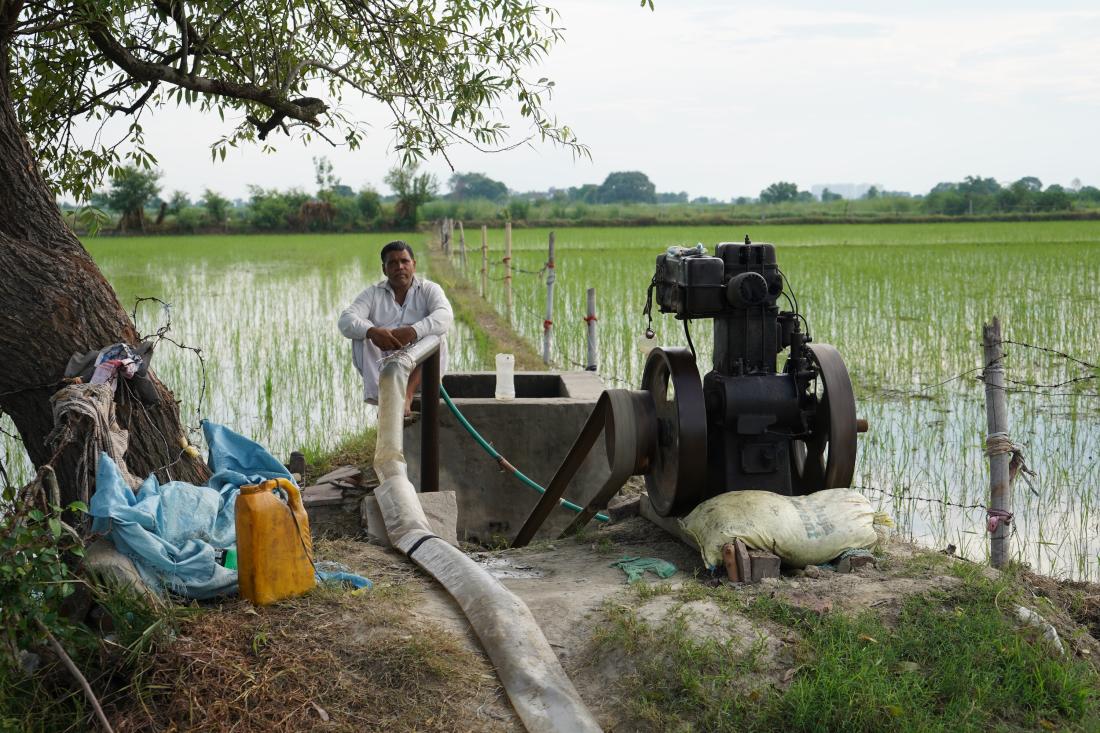Replacing an inefficient policy of free agricultural electricity in India
Policymakers may continue economically inefficient policies for several reasons including subsidizing a particular sector, reducing inequities etc. These policies can reduce welfare for the population as a whole and in some cases can be replaced by more efficient alternatives that continue to serve policymaker goals. In partnership with the Government of Punjab, researchers are conducting a randomized evaluation of the Direct Benefit Transfers for Electricity (DBTE) program that creates a monetary incentive for farmers who are able to reduce consumption below a specified electricity allocation.
Problema de política pública
Policymakers may pursue economically inefficient policies for several reasons. These policies can reduce the population welfare as a whole. For example, providing free energy to farmers may improve agricultural outputs but may also change how farmers use energy, leading to overuse. Consequently, this policy may have adverse effects on the environment and ultimately harm the intended beneficiaries, i.e. farmers, by depleting natural resources, while also straining public finances. Nonetheless, as long as electricity is free, farmers may still benefit from and resist changes to the policy. Can governments find alternatives to inefficient policies that can compensate those who currently benefit from them?
Contexto de la evaluación
In the Indian state of Punjab, farmers are provided with electricity for free, which is part of the reason for widely adopting water-intensive crops, especially rice. This has severely reduced groundwater resources since the 1970s, with an especially rapid decline over the past two decades. According to government estimates in 2013, the state of Punjab used much more water than has been naturally replenished, as the rate of groundwater extraction was 149 percent the rate of natural recharge ¾ the highest across all Indian states. As water resources deplete, farmers require ever more energy and financial support to maintain the same levels of productivity, leading the government to increase subsidies for electricity. Rapid year on year increases in subsidy handouts are evidently unsustainable in the long-run and limit the ability of the state to invest in other sectors. Today the state’s power distribution company has about US$ 3 billion in outstanding debt, and since the state bears the cost of every unit of power, costs are controlled by rationing to 4 to 8 hours per day.
Despite these problems, it is also the case that many small farmers in Punjab would not be able to profitably carry out agriculture without these subsidies. And for many large farmers, this type of regressive subsidy implies very large transfers from the state. Taken together it is unsurprising that farmer unions, such as the Bharatiya Kishan Singh (Indian’s Peasant’s Union), have opposed charging for electricity. Given these facts, the Government of Punjab is considering alternative options that are both acceptable to farmers and would reduce ground-water use and encourage crop switching. One such option is a Direct Benefit Transfer scheme, known as the Paani Bachao, Paisa Kamaon.
Policymakers may pursue economically inefficient policies for several reasons. These policies can reduce the population welfare as a whole. For example, providing free energy to farmers may improve agricultural outputs but may also change how farmers use energy, leading to overuse. Consequently, this policy may have adverse effects on the environment and ultimately harm the intended beneficiaries, i.e. farmers, by depleting natural resources, while also straining public finances. Nonetheless, as long as electricity is free, farmers may still benefit from and resist changes to the policy. Can governments find alternatives to inefficient policies that can compensate those who currently benefit from them?

Detalles de la intervención
Researchers are partnering with the Government of Punjab to conduct a randomized evaluation to test the impact of Paani Bachao, Paisa Kamaon (PBPK) on electricity consumption, groundwater depletion, agricultural production, and cropping choices. PBPK creates a marginal price on water use by providing a per unit incentive to farmers who consume less than a specified allocation of electricity. The allocation is based on pump capacities but is otherwise independent of individual consumption.
Under this voluntary program, beneficiary farmers receive a lump-sum subsidy based on the cost of power for crops irrigation as estimated by experts. Farmers can then choose to spend the entire subsidy on power or reduce their energy consumption and keep the difference between the subsidy and their consumption. They are not charged for energy consumption higher than the subsidy, but are instead incentivized to use less energy.
This evaluation involves 300 electrical feeders across six districts in the state of Punjab with severe groundwater scarcity. A single electricity feeder typically supplies power to about 50 to 150 farmers. Researchers are randomly assigning half of the feeders to the treatment group where connected farmers are offered the opportunity to enroll in the DBTE program. The remaining half of feeders are the comparison group, in which farmers continue receiving unmetered electricity for free, as is the current policy. The Punjab State Power Corporation Limited is enrolling farmers into the program and monitoring their electricity usage during the evaluation. The Agriculture Department will also play a key role in educating farmers on how to save electricity and water, information of how to switch crops, and facilitating the adoption of existing schemes that work towards this end.
In 2020, researchers will survey around 4500 farmers following the implementation of the DBTE program to understand their farming practices, political affiliations, and interest in the voluntary program. In addition, researchers are utilizing multiple sets of administrative data to identify the effects of the program on energy consumption, natural resources, and agricultural production. They are also interested in the cost-effectiveness of the DBTE program to assess the potential of scaling up the program across the entire state of Punjab.
Resultados y lecciones de la política pública
Project ongoing; results forthcoming.
